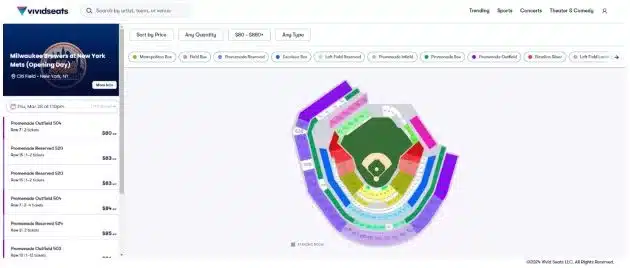Vivid Seats has been targeted by a class action lawsuit filed by a consumer in New York, accusing the ticket resale marketplace of ignoring state law requiring so-called “all-in” ticket pricing. It cites at its core the plaintiff’s purchase of tickets to a New York Mets game at Citi Field in August of 2023 where the initially displayed ticket price and the actual final ticket price were significantly different, violating the state law according to the complaint.
“This is a class action based on Vivid Seats’… failure to properly disclose the total cost for purchase of tickets to New York based places of entertainment,” the lawsuit reads, in part.
“Defendant has violated [the law] by failing to disclose additional “fees” which increases the total cost of the ticket during the purchase process but is only disclosed after the ticket is selected for purchase,” it continues after explaining the laws it says Vivid Seats allegedly violates daily. “The fee is added to the total cost of the ticket price regardless of the delivery method of the ticket.”
Screenshots included in the lawsuit’s formal complaint show listings for Opening Day at Citi Field, which appear to have a price of $80 on first display, only to jump when significant fees are added on a subsequent screen.
“It is only after the customer selects a ticket that Defendant discloses a “Fee” (in this case $29.10, or more than 25% of the purchase price) which increases the total cost of the ticket during the purchase process on every ticket purchase,” the complaint reads.
Changes to New York’s Arts & Cultural Affairs laws that went into effect in August of 2022 have required ticketing websites to display the total cost of a ticket including fees to the consumer before the ticket is selected. The price is not supposed to increase at any time during the purchasing process, with exceptions for actual delivery costs involved with the shipping of tickets, should there be any.
FURTHER READING | New York Passes Ticketing Law Adding “All-In” Pricing Requirement
The lawsuit argues that Vivid Seats should be on the hook for at minimum $5 million, based on its estimates that the marketplace has sold at least 100,000 tickets to New York events during the applicable period, and is liable for at least $50 in statutory damages for every ticket sold.
The case highlights the broad spectrum of approaches that ticketing companies have adopted in recent years as regulators and lawmakers have made taken steps towards requiring transparent prices for ticket purchases on both primary and secondary ticketing marketplaces. The Federal Trade Commission has taken steps towards making rules that require fee disclosure, and several laws have been proposed at the federal level that would mandate so-called “all-in” pricing, particularly in the wake of the Biden Administration making such legislation (or rulemaking) a priority.
FURTHER READING | Biden Administration to Set Rules Requiring All-In Ticket Pricing
Multiple ticketing companies pledged to go forward with transparent pricing systems, but those companies – Ticketmaster and SeatGeek among them – simply allowed consumers the option of viewing ticket listings with fees included, but only did “all-in” prices by default in states where it had been mandated by law. A TicketNews review of the industry following the 2019 FTC workshop on ticketing that made it clear companies were fine with all-in pricing showed that even then, most ticketing platforms allowed consumers to choose to view prices including fees, while a tiny fraction – TickPick, MEGASeats, and Ticket Club – did true “all-in” pricing as a default. Vivid Seats was the lone platform that insisted upon hiding fees until after consumer contact information was entered.
FURTHER READING | Despite “All-In Pricing” Headlines, No Significant Ticketmaster Changes Coming
New York is one of the pioneers in actually getting a law requiring such practices on the books, followed by Connecticut, which had an “all-in” ticket pricing law go into effect in 2023. Federal laws or regulations have not yet been brought to bear, and despite some high profile promises from companies to voluntarily bring forward “all-in” pricing models for consumers, the reality is that most companies are holding off from committing to displaying fully transparent pricing until it’s both required and enforced.
Vivid Seats has not responded publicly to the lawsuit being filed as of Tuesday afternoon.





